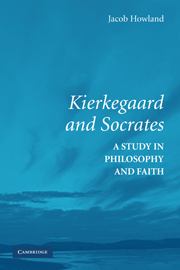Book contents
- Frontmatter
- Contents
- Note on Texts and Translations
- Acknowledgments
- Kierkegaard and Socrates
- Introduction
- 1 Johannes Climacus, Socratic Philosopher
- 2 Climacus's Thought-Project
- 3 Platonic Interlude: Eros and the God
- 4 Climacus's Poetical Venture
- 5 The Paradox and the Passion of Thought
- 6 Self-Love and Offense
- 7 Faith and the Contemporary Follower
- 8 Climacan Interlude: On Historical Necessity
- 9 The Follower at Second Hand and The Moral
- 10 Socrates in Postscript
- Epilogue: Kierkegaard on Christ and Socrates
- Works Cited
- Index
6 - Self-Love and Offense
Published online by Cambridge University Press: 01 December 2009
- Frontmatter
- Contents
- Note on Texts and Translations
- Acknowledgments
- Kierkegaard and Socrates
- Introduction
- 1 Johannes Climacus, Socratic Philosopher
- 2 Climacus's Thought-Project
- 3 Platonic Interlude: Eros and the God
- 4 Climacus's Poetical Venture
- 5 The Paradox and the Passion of Thought
- 6 Self-Love and Offense
- 7 Faith and the Contemporary Follower
- 8 Climacan Interlude: On Historical Necessity
- 9 The Follower at Second Hand and The Moral
- 10 Socrates in Postscript
- Epilogue: Kierkegaard on Christ and Socrates
- Works Cited
- Index
Summary
One of the stylistic peculiarities of Fragments is the habit Climacus develops of concluding each chapter by responding to the objections of an imagined interlocutor. Chapter Three is no exception. Having explained that the relationship between the understanding and the unknown god is one of absolute difference, Climacus supposes that someone might take offense at this notion. Such a person might accuse him of being a “capricemonger,” who has presented his readers with “a caprice” that is “ludicrous” and “so unreasonable that I would have to lock everything out of my consciousness in order to think of it” (46).
In responding to this accusation, Climacus puts his finger on the origins of the feeling of offense that it so strongly expresses. Locking everything out of one's consciousness, he observes, “is exactly what you have to do, but then is it justifiable to want to keep all the presuppositions you have in your consciousness and still presume to think about your consciousness without any presuppositions?” (46, emphasis in original). When the objector envisions locking everything out of his consciousness, he finds it “unreasonable” to do so. But his judgment is at bottom nothing more than an expression of his desire to keep hold of everything that is in his consciousness, and in particular to cling to his “presuppositions.” He is, in other words, deeply prejudiced in favor of his own understanding, and this prejudice causes him to meet any challenge to his understanding – particularly the suggestion that his condition is one of untruth – with hostility.
- Type
- Chapter
- Information
- Kierkegaard and SocratesA Study in Philosophy and Faith, pp. 129 - 136Publisher: Cambridge University PressPrint publication year: 2006

